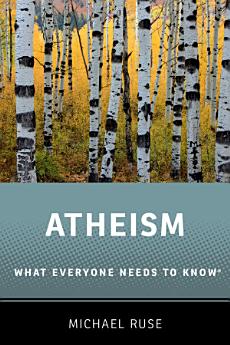Atheism: What Everyone Needs to Know®
ડિસે 2014 · Oxford University Press
ઇ-પુસ્તક
288
પેજ
family_home
પાત્ર
info
reportરેટિંગ અને રિવ્યૂ ચકાસેલા નથી વધુ જાણો
આ ઇ-પુસ્તક વિશે
Over the last decade, "New Atheists" such as Sam Harris, Richard Dawkins, and Christopher Hitchens have pushed the issue of atheism to the forefront of public discussion. Yet very few of the ensuing debates and discussions have managed to provide a full and objective treatment of the subject. Atheism: What Everyone Needs to Know provides a balanced look at the topic, considering atheism historically, philosophically, theologically, sociologically and psychologically. Written in an easily accessible style, the book uses a question and answer format to examine the history of atheism, arguments for and against atheism, the relationship between religion and science, and the issue of the meaning of life-and whether or not one can be a happy and satisfied atheist. Above all, the author stresses that the atheism controversy is not just a matter of the facts, but a matter of burning moral concern, both about the stand one should take on the issues and the consequences of one's commitment.
લેખક વિશે
Michael Ruse was born in 1940 in England. Raised in a Quaker family, he went to Bootham School in York and then to the University of Bristol, where he majored in mathematics and philosophy. In 1962 he emigrated to Canada and did graduate work at McMaster University in Ontario. He returned to Bristol to do his doctoral degree in philosophy. He taught at the University of Guelph from 1965 to 2000, and then to avoid compulsory retirement moved south to Florida State University. He is the author or editor of over fifty books, the founding editor of Biology and Philosophy, the recipient of four honorary degrees, a Guggenheim Fellow, a Gifford Lecturer, and a Fellow of the Royal Society of Canada. His academic interests are in the history and philosophy of the biological sciences and he is an expert on the work and influence of Charles Darwin. In recent years, his attention has been turned increasingly towards the relationships between science and religion. He is not a believer, but thinks that the two can exist together harmoniously.
આ ઇ-પુસ્તકને રેટિંગ આપો
તમે શું વિચારો છો અમને જણાવો.
માહિતી વાંચવી
સ્માર્ટફોન અને ટૅબ્લેટ
Android અને iPad/iPhone માટે Google Play Books ઍપ ઇન્સ્ટૉલ કરો. તે તમારા એકાઉન્ટ સાથે ઑટોમૅટિક રીતે સિંક થાય છે અને તમને જ્યાં પણ હો ત્યાં તમને ઑનલાઇન અથવા ઑફલાઇન વાંચવાની મંજૂરી આપે છે.
લૅપટૉપ અને કમ્પ્યુટર
Google Play પર ખરીદેલ ઑડિઓબુકને તમે તમારા કમ્પ્યુટરના વેબ બ્રાઉઝરનો ઉપયોગ કરીને સાંભળી શકો છો.
eReaders અને અન્ય ડિવાઇસ
Kobo ઇ-રીડર જેવા ઇ-ઇંક ડિવાઇસ પર વાંચવા માટે, તમારે ફાઇલને ડાઉનલોડ કરીને તમારા ડિવાઇસ પર ટ્રાન્સફર કરવાની જરૂર પડશે. સપોર્ટેડ ઇ-રીડર પર ફાઇલો ટ્રાન્સ્ફર કરવા માટે સહાયતા કેન્દ્રની વિગતવાર સૂચનાઓ અનુસરો.







